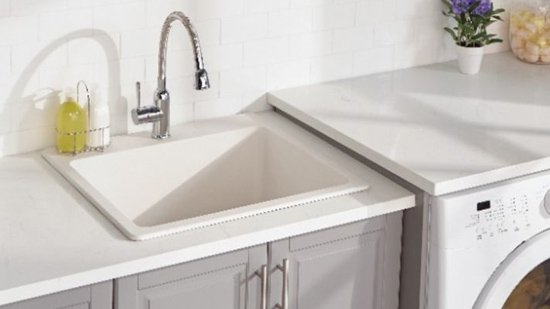Is the Water Plumbed to Your Laundry Sink Potable?
Water is an essential resource that we use in our daily lives for various purposes, including cooking, drinking, and cleaning. However, not all water is safe to consume. This raises the question: Is the water plumbed to your laundry sink potable? To understand the answer, we must first grasp the importance of potable water.
Potable water refers to water that is safe for human consumption. It is free from harmful contaminants and meets the standards set by regulatory bodies. Access to potable water is crucial for maintaining good health and preventing waterborne diseases. If it’s for drinking, cooking, or cleaning, using potable water ensures the safety and well-being of your household.

Photo by micoope
Common sources of potable water in households
In most households, potable water is supplied through the municipal water system. This water is treated and tested to meet the required safety standards. Municipal water undergoes a rigorous process of filtration, disinfection, and monitoring to ensure its potability. It is then delivered to homes through a network of pipes.
Apart from the municipal supply, some households rely on private wells for their water needs. Private wells can provide potable water if they are properly constructed, maintained, and regularly tested for quality. It is important to note that the responsibility for ensuring the potability of private well water lies with the homeowner.
Is the water plumbed to your laundry sink potable?
Now that we understand what potable water is and its sources, let’s focus on the water plumbed to your laundry sink. In many households, the laundry sink is connected to the same water supply as the rest of the house. This means that if your main water supply is potable, the water in your laundry sink should also be safe to use.
There are cases where the water plumbed to the laundry sink may not be potable. For example, if you have a separate source of water for your laundry, such as a rainwater harvesting system, it may not undergo the same treatment and testing as the municipal supply. In such instances, it is important to assess the potability of the water before using it for laundry purposes.
Factors to consider when determining if the water is potable
To determine if the water plumbed to your laundry sink is potable, you need to consider various factors. Firstly, you should know the source of your water and whether it is from a municipal supply or a private well. If it is from the municipal supply, you can have confidence in its potability, as it goes through regular testing and treatment. If your water comes from a private well or an alternative source, you need to take extra precautions.
Secondly, consider the age and condition of your plumbing system. Older plumbing systems may have corroded pipes that can introduce contaminants into the water. If you suspect any issues with your plumbing, it is recommended to have it inspected and repaired by a professional.
Lastly, consider any potential cross-contamination. If your laundry sink is connected to a separate water source or if you use it for other purposes that may introduce contaminants, such as cleaning paintbrushes or gardening tools, there is a higher risk of non-potable water entering the system.
Potential risks of using non-potable water in your laundry
Using non-potable water in your laundry can pose several risks. Firstly, if the water contains harmful bacteria, viruses, or chemicals, it can cause skin irritation or other health issues when it comes into contact with your clothes. This is especially concerning if you have sensitive skin or allergies.
Secondly, non-potable water may leave behind residue or stains on your clothes. The presence of minerals, sediments, or other impurities can affect the cleanliness and appearance of your laundry. Additionally, using non-potable water can lead to the buildup of deposits in your washing machine over time, reducing its efficiency and lifespan.
Lastly, if you use non-potable water in your laundry, you run the risk of cross-contamination. If your laundry sink is connected to a separate water source, contaminants from that source can enter your plumbing system and potentially contaminate the rest of your water supply.
How to test the water quality in your laundry sink
To ensure the potability of the water in your laundry sink, it is recommended to test its quality regularly. There are several ways to test the water, depending on your specific concerns and requirements.
One option is to use at-home water testing kits. These kits typically come with instructions for collecting a water sample and analyzing it for various contaminants. They can provide a basic assessment of the water quality and indicate if further testing or treatment is necessary.
Another option is to hire a professional to conduct a comprehensive water analysis. They will collect samples from your laundry sink and send them to a certified laboratory for testing. This will give you a detailed report on the water quality, including information on any potential contaminants and their levels.
Steps to make the water in your laundry sink potable
If the water in your laundry sink is found to be non-potable, there are steps you can take to make it safe for use. The most effective method is to install a point-of-use water treatment system specifically designed for laundry purposes. These systems can remove a wide range of contaminants, including bacteria, viruses, chemicals, and sediments, ensuring that the water is safe and clean.
Alternatively, you can consider using water disinfection methods such as boiling or chemical disinfection. Boiling the water for at least one minute can kill most types of bacteria and viruses. Chemical disinfection involves adding chlorine or other disinfectants to the water according to the manufacturer’s instructions.
It is important to note that these methods may not be as effective in removing certain contaminants, such as heavy metals or chemicals.
Benefits of using potable water in your laundry
Using potable water in your laundry offers several benefits. Firstly, it ensures that your clothes are clean and free from any potential contaminants. This is particularly important if you have allergies or sensitive skin, as non-potable water can cause skin irritation or other adverse reactions.
Secondly, using potable water can prolong the lifespan of your washing machine and other laundry appliances. Non-potable water can lead to the buildup of mineral deposits, which can affect the performance and efficiency of your appliances. By using potable water, you can minimize the risk of such issues and extend the longevity of your laundry equipment.
Lastly, using potable water in your laundry promotes overall household hygiene. Clean clothes contribute to a healthy living environment, reducing the risk of infections or illnesses. By prioritizing the use of potable water, you can ensure the safety and well-being of your entire household.
Conclusion
The question of whether the water plumbed to your laundry sink is potable is an important one. While in many cases, the water will be safe to use, it is essential to consider factors such as the water source, plumbing system, and potential cross-contamination. Regular testing of the water quality is recommended, and if non-potable water is detected, appropriate treatment methods should be employed.
By using potable water in your laundry, you can enjoy clean clothes, prolong the lifespan of your appliances, and promote household hygiene. The safety and quality of the water you use in your laundry sink are directly linked to the well-being of your household. Take the necessary steps to ensure potable water is available for all your water needs, and prioritize the health and safety of your family.



